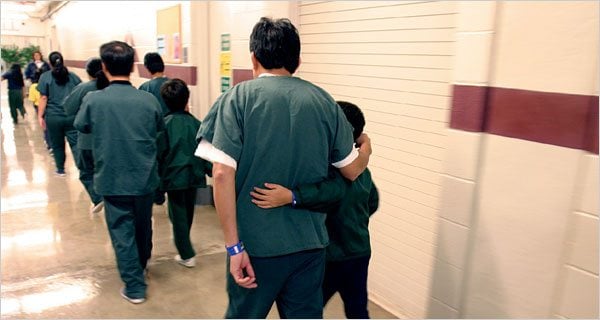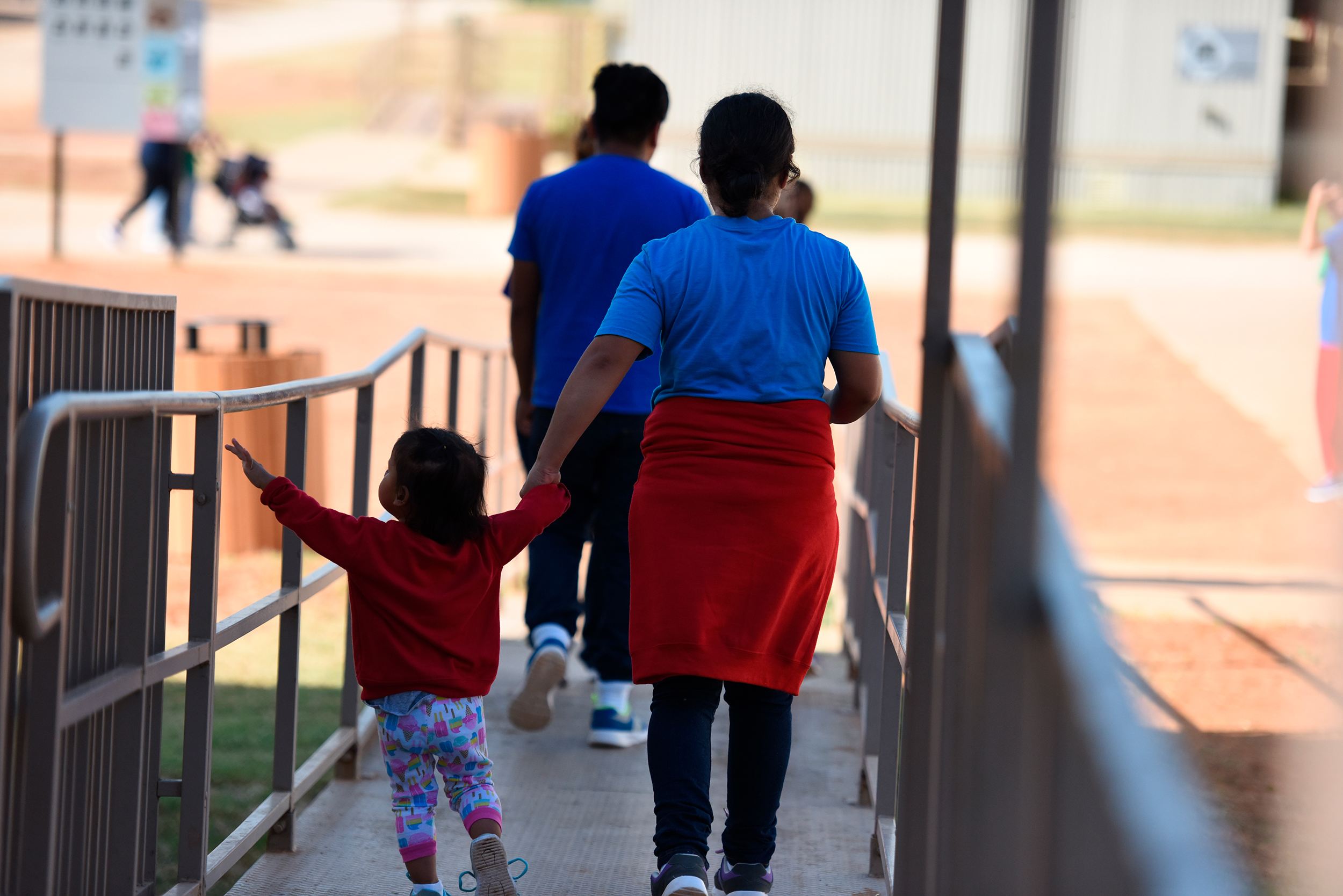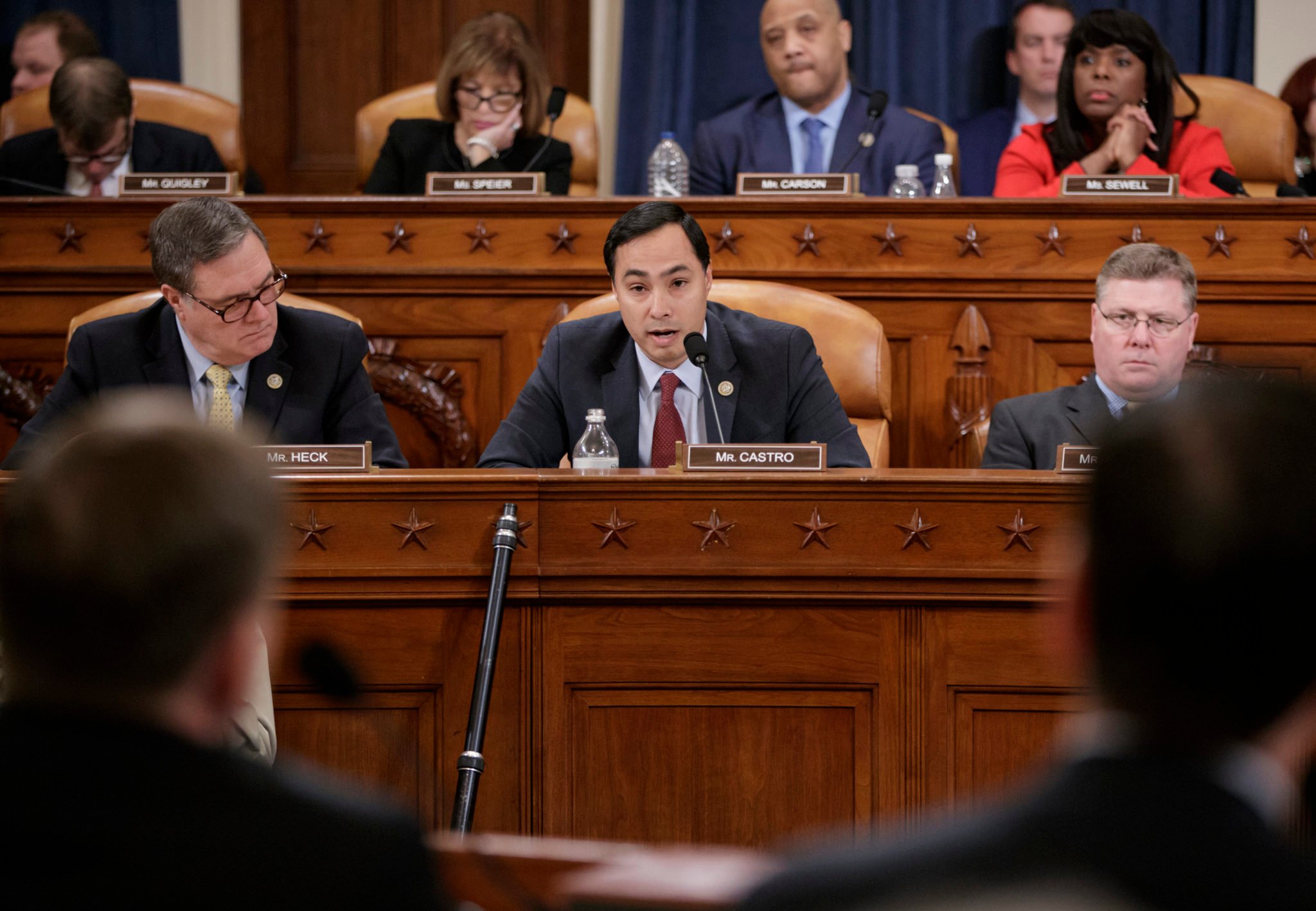
Despite Systemic Failures, State Moves to License Detention Centers for Child Care

Above: Child deaths while in state custody are on the rise as a troubled Department of Family and Protective Services struggles to cope, but Texas is moving forward with plans for the department to license immigrant detention centers as child care providers.
As Texas’ Department of Family and Protective Services (DFPS) makes headlines for inadequate monitoring of children in state care — in some cases, deathly inadequate monitoring — immigrant rights advocates are calling on state officials to abandon an effort to add to the department’s load by licensing immigrant family detention centers as child care providers.
DFPS is in turmoil: five top leaders have resigned in recent weeks. A Dallas Morning News report has found that overcrowded CPS offices have been serving as lodging for foster care children, and caseworkers are overworked and underpaid, handling many times more cases than child welfare experts recommend. And a 2014 Observer investigation found that 14 children died from abuse and neglect while in the state’s custody in fiscal year 2013.
Nonetheless, the state has moved forward with plans to grant child care licenses to Texas’ two immigration family detention centers — the 500-bed Karnes County Residential Center and 2,500-bed South Texas Family Residential Center in Dilley, both prison-like facilities that house women and their children who are seeking asylum in the United States.
At a public hearing on Wednesday in Karnes City, immigration advocates reiterated their concerns, which they say are heightened in light of the troubles at DFPS.
“Adding two large residential operations to [DFPS’] workload with no increase in staff begs the question of how effectively they can monitor these facilities, respond to complaints and ensure the safety of children,” said Peggy Morton, a social justice activist and member of the First Unitarian Universalist Church of Austin, which has long advocated for the closure of family detention centers.
Critics of plans to license detention centers as child-care facilities argue that Texas’ motivation is not the wellbeing of detained children, but rather the enforcement of federal immigration policy.
Last summer, a federal judge ordered the release of migrant children from family detention centers, citing “deplorable conditions” in violation of the 1997 Flores v. Meese agreement, which states that children should not be held in unlicensed facilities. The Berks Family Residential Center in Pennsylvania is the only other immigrant family detention facility in the country, and in late January, the state revoked its child-care license.
Wednesday’s meeting, hosted by the private prison corporation GEO Group, Inc., that runs Karnes, is part of the required licensure process for a child-care center in a county with fewer than 300,000 residents.
The Karnes facility, previously an all-male immigrant detention center, was converted to a family detention center in 2014 after the influx of migrant women and their children fleeing violence and persecution in Central America and Mexico. Since its conversion, allegations of sexual abuse and unhealthy conditions — poor food, minimal medical and mental health care and mistreatment by prison staff — have surfaced, reminiscent of human rights violations uncovered at the northeast Austin’s T. Don Hutto Residential Center.
Last September, DFPS made a move to keep the facilities open by creating a new child care- licensing category for detention centers in order to comply with federal rules. The agency did so without soliciting public comment, a move that riled advocacy groups who demanded a public hearing and filed a lawsuit against DFPS.
“This is a political and profit-driven decision. It’s not in the best interests of the people of this county, Texas and the people coming here for our help.”
After a temporary halt on licensure and a December hearing that drew more than 40 witnesses and thousands of pages of written comments decrying the state’s efforts, DFPS and the Health and Human Services Commission announced in February that the state would move forward.
Rev. Chuck Freeman, of the Texas Unitarian Universalist Justice Ministry, has testified against the licensure of Texas’ family detention centers at all three public hearings so far. Wednesday, he asked both the state and GEO Group to listen to the public’s overwhelming opposition.
“Why aren’t you listening?” he said. “This is a political and profit-driven decision. It’s not in the best interests of the people of this county, Texas and the people coming here for our help. …You can’t be a spiritual person, a moral person, if you have fundamental lies at the foundation of what you’re doing.”
Already, grievances and reports of violations at Karnes have gone unaddressed, testified Elissa Steglich, a law professor at University of Texas at Austin.
Citing internal audits obtained by the Austin American-Statesman, Steglich shared a laundry list of violations and unaddressed concerns at Karnes: insufficient formula for infants, insufficient child care and lack of supervision, unsecured hazardous chemicals and security cameras that don’t work. Steglich also noted a new rule imposed by the GEO Group that requires mothers to meet their lawyers with their children present, which puts the children at risk of additional trauma if their mothers are recounting domestic and sexual violence.
Not everyone, though, sees such reports as alarming. Wednesday’s meeting was the first time the state heard in-person testimony in support of child-care licensure. Most who spoke in favor were GEO Group staff, who ranged from mental health caseworkers to shift supervisors and a librarian. Many thanked the company, which employs 400 Karnes City residents, for their jobs in a volatile economy. Others described their joy working with mothers and children.
Robin Alaniz, a shift supervisor, said that “most of the time, [migrant] moms say they don’t want to leave, they want to stay with us,” eliciting murmurs from the immigrant advocates in the room.
Maggie Hunt, who owns a small hotel in Karnes City and called herself “a business partner” with GEO, told company and state representatives that the community “stood up” in 2014 when the federal government needed a place to detain migrant mothers and children, and she wants to see her hometown do it again. Truitt Hunt, Maggie’s husband, praised GEO’s decade-long presence in Karnes City and called reports of violations at the detention center “unconfirmed.”
Steglich shared a laundry list of violations and unaddressed concerns at Karnes: insufficient formula for infants, insufficient child care and lack of supervision, unsecured hazardous chemicals and security cameras that don’t work.
The GEO Group and Corrections Corporation of America, which operates the Dilley detention center, have submitted child-care license applications to DFPS. Before moving ahead with state-mandated inspections of the facilities, DFPS will convene one more public meeting in Dilley on April 26.
“The public hearings have to occur prior to DFPS issuing an initial license,” DFPS spokesperson Julie Moody told the Observer in an email. “At this point we aren’t close to issuing an initial license because we still have many activities to complete. After inspections of both are completed we’ll go back out to make sure any needed corrections are made before issuing an initial license.”


